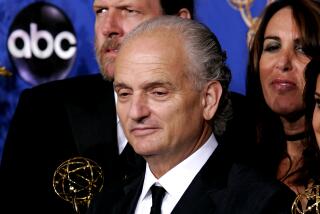‘Sopranos’ fans chase after an explanation
- Share via
The black screen. In less than 24 hours, it has become the monolith from “2001,” the Rorschach blot, Stonehenge and “Ulysses” all rolled into one. The sudden blank screen that marked the final moments of the final episode of “The Sopranos” is the new dark mirror in which viewers see the reflections of their own dreams and desires. In more than 150 e-mails to the paper and the Showtracker blog, readers have deconstructed that image with the passion and alacrity of literary theory post-grads on an espresso bender.
It is the sort of collection the Writer’s Guild should be panting to archive. For once, the primary relationship was not between viewer and character but between viewer and writer. Unlike other discussions about popular television shows, in which the characters are referred to as if they were living people, virtually every response referred to David Chase by name, spoke more of him than of Tony, more of the writer’s habits and proclivities than the themes of the show or the meaning of the characters.
For those who loved the ending, it was perfect because it followed Chase’s sensibilities; dissenters hated it because they have always thought Chase a cheat. If it was Chase’s intention to have fans talking about him, his proclivities as a writer and a human, as opposed to his show, then he more than succeeded.
As with a lover’s quarrel, initial reactions were mostly heated and negative -- viewers felt tricked and let down. But as time passed, people mellowed, began to consider where the ending fell in the entire “Sopranos” Weltanschauung. Then the mythic overtones that drew many to the series set in as people rushed to fill in the literal blank, many happy to be part of the creative process that had fascinated them for so long. (One wonders at the level of productivity among “Sopranos” fans on the day after -- fingers crossed no one responding was a surgeon or air traffic controller.)
Most popular theory? The blank screen signified Tony’s death (exactly as he described it to Bobby on their fateful fishing trip -- sudden blackness). Or it was Chase literally “pulling the plug” on his creation. It represented the paranoia in which Tony lived his life, Uncle Junior’s descent into Alzheimer’s, the repressed panic of the female characters. The darkness symbolized the demise of the Italian community, the corruption of the American soul, of American television or (my personal favorite) Chase’s commentary on the country’s dependence on cable TV.
The theories are bountiful and boundless and reveal a level of sophistication that, while not surprising among fans of such a multilayered literate show, seems to contradict the conventional wisdom that television kills creative thought, if not actual brain cells, among viewers.
Nobody would call these “Sopranos” fans couch potatoes.
Obsessive, perhaps -- here’s to the viewer who looked up the “Twilight Zone” episode, another who matched the songs Tony browsed on the jukebox to the stages of his life, a third who noted that many of the diner’s occupants had appeared on the show before -- but then isn’t obsession one requirement of intelligent analysis? Still there is an overall awareness of how television, and the writing process, works, of what the show stood for, philosophically and within the entertainment industry.
It all goes to prove one point: It didn’t really matter how Chase chose to end his legendary series. Whacked or arrested, suddenly heroic or evil, slow pan or sudden black, some people would have loved it, some people would have hated it.
In today’s world, it turns out, one does not go out with either a bang or a whimper, but with a thousand e-mails.
More to Read
The biggest entertainment stories
Get our big stories about Hollywood, film, television, music, arts, culture and more right in your inbox as soon as they publish.
You may occasionally receive promotional content from the Los Angeles Times.











